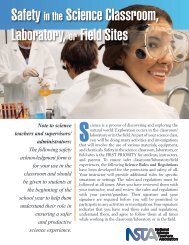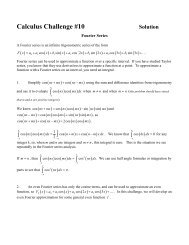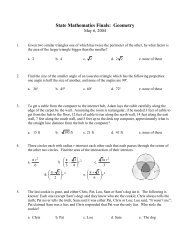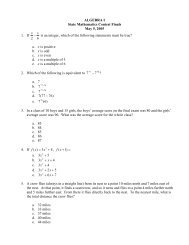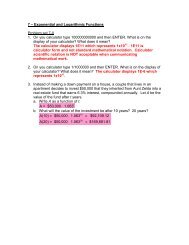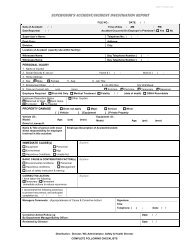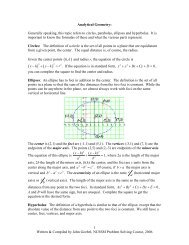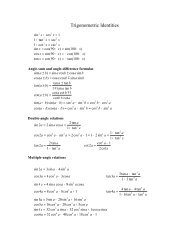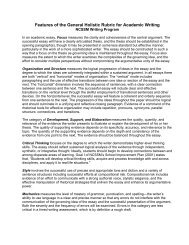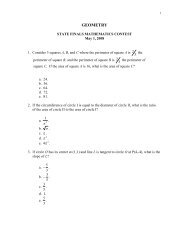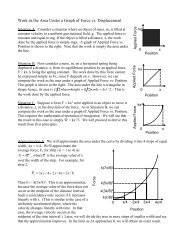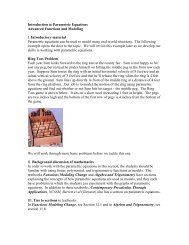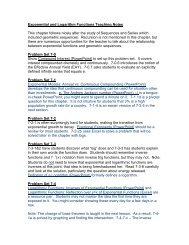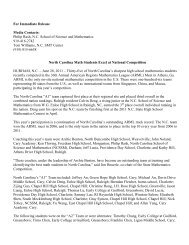NCSSM COURSE CAtAlOG - North Carolina School of Science and ...
NCSSM COURSE CAtAlOG - North Carolina School of Science and ...
NCSSM COURSE CAtAlOG - North Carolina School of Science and ...
Create successful ePaper yourself
Turn your PDF publications into a flip-book with our unique Google optimized e-Paper software.
Prerequisite: Completion <strong>of</strong> three trimesters <strong>of</strong> AS303 Writing <strong>and</strong> American<br />
Studies or AS305 American Studies or completion <strong>of</strong> two trimesters <strong>of</strong> AS303 or<br />
AS305 <strong>and</strong> permission <strong>of</strong> the Dean <strong>of</strong> Humanities.<br />
Meeting pattern: Four periods per week including lab.<br />
This interdisciplinary, team-taught course provides a survey <strong>of</strong> Western societies<br />
from the ancient world to the High Middle Ages. The course emphasizes skills in<br />
reading, writing, critical thinking, research, <strong>and</strong> public speaking. Through<br />
analyzing a variety <strong>of</strong> texts, students explore the cultures <strong>of</strong> the ancient<br />
Mesopotamians, Hebrews, Greeks, Romans, early Christians, <strong>and</strong> Europeans <strong>of</strong><br />
the Middle Ages. Readings are selected from The Epic <strong>of</strong> Gilgamesh, the Old<br />
<strong>and</strong> New Testaments, <strong>and</strong> works by Homer, Aristophanes, Thucydides, Plato,<br />
Aristotle, Cicero, Vergil, St. Augustine, Thomas Aquinas, <strong>and</strong> Dante. Some<br />
questions the course addresses include: How have people organized their<br />
societies <strong>and</strong> why? How has religion shaped their lives? How has the individual<br />
been defined, <strong>and</strong> what have been the limits <strong>and</strong> possibilities for exercising freewill<br />
in different cultural contexts? How have people defined themselves in<br />
relationship to nature? How have ethical <strong>and</strong> moral systems been created, <strong>and</strong><br />
how have they functioned? What has been the role <strong>of</strong> the arts in each culture?<br />
What are the lasting influences <strong>of</strong> these societies on the modern world?<br />
EN444 Western Civilization: Wisdom, Revelation, Reason & Doubt II (The Late<br />
Middle Ages to the Enlightenment)<br />
One trimester<br />
Credit: One unit core English credit, one unit core elective credit.<br />
Prerequisite: Completion <strong>of</strong> three trimesters <strong>of</strong> AS303 Writing <strong>and</strong> American<br />
Studies or AS305 American Studies or completion <strong>of</strong> two trimesters <strong>of</strong> AS303 or<br />
AS305 <strong>and</strong> permission <strong>of</strong> the Dean <strong>of</strong> Humanities.<br />
Meeting pattern: Four periods per week including lab.<br />
This interdisciplinary, team-taught course provides a survey <strong>of</strong> Western societies<br />
from the Late Middle Ages to the Enlightenment. The course emphasizes skills in<br />
reading, writing, critical thinking, research, <strong>and</strong> public speaking. Through<br />
analyzing a variety <strong>of</strong> texts, students explore the Renaissance, Reformation,<br />
Scientific Revolution, <strong>and</strong> Enlightenment in Europe. Readings are selected from<br />
works by Chaucer, Machiavelli, Luther, Shakespeare, Galileo, Montaigne,<br />
Descartes, Hobbes, Locke, <strong>and</strong> Voltaire. Some questions the course addresses<br />
include: How have people organized their societies <strong>and</strong> why? How has religion<br />
shaped their lives? How has the individual been defined, <strong>and</strong> what have been<br />
the limits <strong>and</strong> possibilities for exercising free-will in different cultural contexts?<br />
How have people defined themselves in relationship to nature? How have<br />
ethical <strong>and</strong> moral systems been created, <strong>and</strong> how have they functioned? What<br />
has been the role <strong>of</strong> the arts in each culture? What are the lasting influences <strong>of</strong><br />
these events <strong>and</strong> ideas on the modern world?<br />
23



